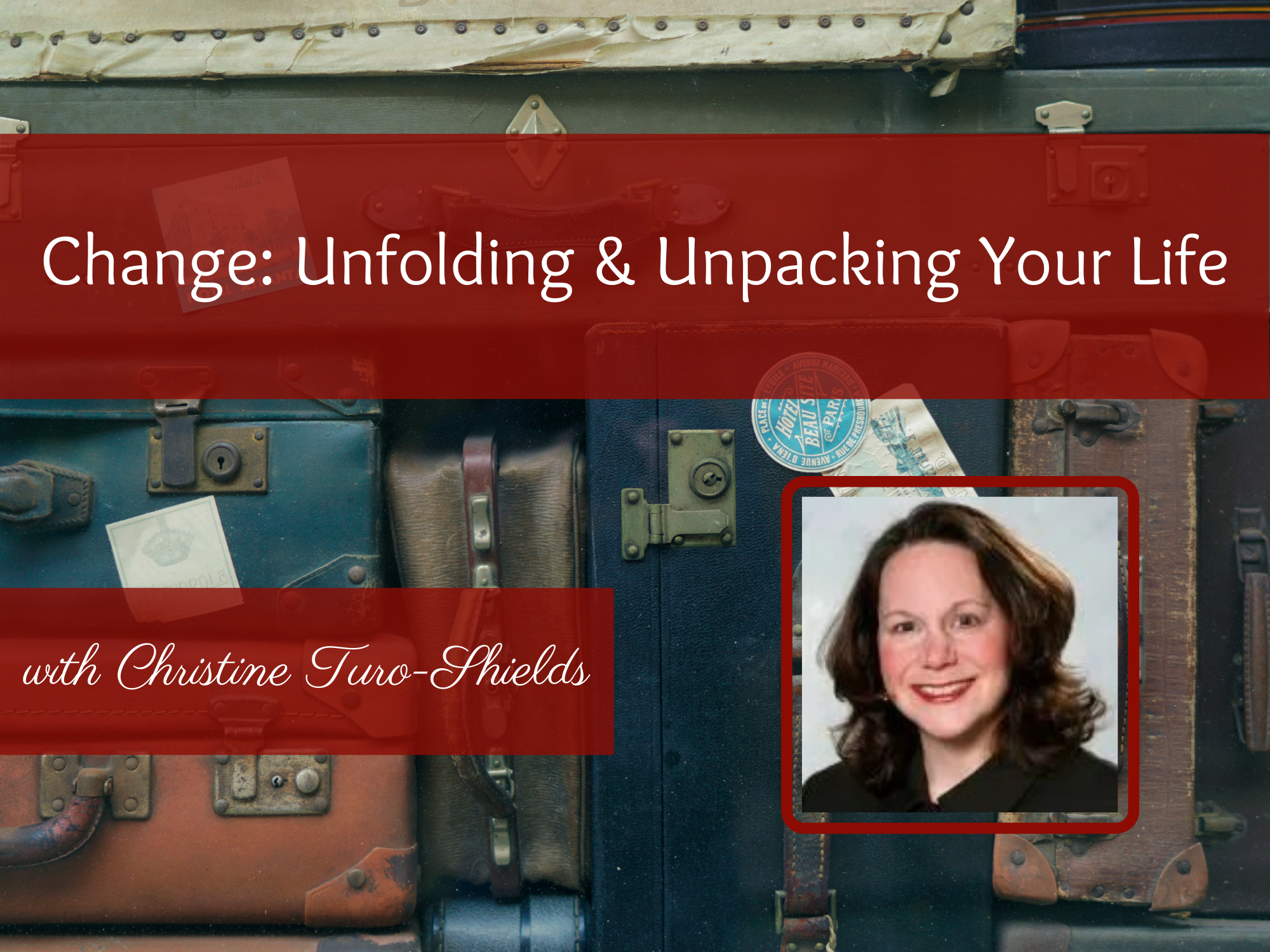When Christine Turo-Shields was just 19 years old, she began working in a 90-day residential facility for addiction recovery. Each day, she passed a sign hanging on the wall that said “Nothing is constant but change.” This small saying was the beginning of Christine’s journey with change, and it has continued to be with her throughout the years.
Now, decades later, Christine is an EMDR therapist who regularly works with trauma in the therapy setting. She also sits on the state board for the American Foundation for Suicide Prevention. She fondly says, “I’ve been in the counseling field for 36 years. My job continues to be as gratifying today as it was when I started.”
We interviewed Christine, an owner of Kenosis Counseling Center, about how therapy can change lives, why “Change Your Life” is a key part of the Kenosis mantra, and the significance that change can have in our everyday lives.

How Can Therapy Help with Change in Your Life?
After being in the mental health field for more than 30 years, in many roles, change has been an ever present part of Christine’s life personally and professionally. She chats serenely and candidly about change, explaining, “Our walk in life is all about change. Life is fluid. This notion of shifting has always been with me personally.“
In her time as a therapist, she’s learned to accept change, and help clients learn as well. As Christine points out, “Life events happen that we don’t script into our lives. We don’t script, ‘I’m going to have a loved one died by suicide.’ We don’t script, ‘I’m going to get diagnosed with pancreatic cancer.’ We don’t script ‘I’m going to be in a motor vehicle accident.’” These kinds of tragedies and unscripted events are what make the human experience unpredictable and complex.
We all have our own stories that we’re writing on our life journey, but we seem to leave out these bad pieces. “We don’t write the bad things into our lives, those tragic things. So we are left to adapt and shift and change along with the changing seasons of life,” she says.
As difficult and isolating as change may be, we’re never really alone. Therapy can help us navigate these changes, even from the very beginning. Christine notes, “Individuals who are coming and seeking out counseling are doing so because they want something to be different in their lives.”
Therapy can be a great option whether you’re facing an obstacle in your life, want to do something differently – like breaking a bad habit or developing a friendship – or even dealing with those unscripted life events that appear out of nowhere.
There is one catch: therapy doesn’t help you get your “old life” back.
It can help you create a new life, perhaps even better than you had before. Christine notes that when clients tell her that they want to “go back to normal” she tells them “We’re past that. We’ve got to figure out a way for you to shift,” in the kindest way possible, of course.
The whole therapy process is about change. Whether or not clients know what change they need or want when they come in for the first appointment, the root is always some version of change.
“Sometimes the client comes in with a clear sense of what they want and what they need. And other times what we do in therapy is listening and then reflecting on ‘Have you given thought to this?’” Christine likes to call this “therapeutic archeology” – helping clients dig deeper to find out what’s really going on.
There are also many types of therapy specialists at Kenosis. Although Christine works in therapies like EMDR, other therapists have different approaches.
Some therapy traditions represented at Kenosis include: cognitive behavioral therapy, Acceptance Commitment Therapy (ACT therapy), attachment-based therapy, and even interpersonal therapy. Because there are so many unique approaches, Christine explains, “We can leverage people to make the changes clients identify.”

What Does it Mean to “Change Your Life”?
Changing your life may, at first, seem a little intimidating. After all, it’s something so big in our minds that it may be unclear how something small could make a difference.
Christine reassures that, “Sometimes to change your life, you just need the really basic things.” Change isn’t always about making your life look completely different or altering every piece of your existing life.
“One of my therapeutic mantras is ‘the little things are the big things.’ For example, sleep is a little, simple thing, but if we can get sleep online, we can reduce anxiety and depression, sometimes 30 or 40%,” she says. Anxiety and depression are tough to cope with, but knowing that a small sleep cycle change – even just an hour – could help gives you a reason to be hopeful.
In order to make changes in your life, you also need to make sure that you’re taking care of yourself first. Christine says, “It can seem selfish, to take care of yourself,” and many of her clients, especially women, feel this way. She reminds them that, on airplanes, you’re supposed to put your own oxygen mask on first because if you pass out, you’re not going to be able to help anybody else.
The same applies in your daily life. “If you completely deplete yourself, you’re not going to be any good to your loved one, employer, kids, or spouse. Self-care is really one of those aspects of change yourself that I always evaluate,” Christine stresses. Self-care is critical. So critical, in fact, that Christine runs a training about it called Professional R & R: Resilience and Rejuvenation.
Sometimes you reach a point in your life where you feel that you just “can’t get through this” or that your life has become too much. The good news: “We’re not alone. There’s always someone out there, a life raft we can reach for. If we don’t have it currently, we can create it and put it in place. For some people, the first step is therapy. The therapist becomes their first life preserver,” Christine explains.
Creating a support network around ourselves is an important piece of changing your life and being able to adapt. Christine says, “We don’t always have to get there ourselves. That’s another big aspect of change – identifying and/or creating a network of support.”
The most important thing about changing your life is “Recognizing and embracing a sense of resilience.” Christine believes, “individuals are more resilient than they know or that they give themselves credit for. Resilience allows us to adapt.“
One of the ways that she helps clients is to help them learn how to be more resilient. “I want to help people be more bendable. It’s like a willow tree versus an oak tree. If a sheer wind hits an oak tree, it can literally snap in half and splinter. But not a willow tree. The willow has this invasive root system underneath it almost as big as its canopy, which is why it is so bendable and flexible.”
Christine often helps her clients reach for their inner “willow” energy so that they can be more flexible with change in their own lives.

What is the Significance of Changing Your Life?
Ultimately, “Life is about unfolding and unpacking,” says Christine. “Change is all about learning. We just continue to learn and adapt.” We can learn to be more flexible for life’s unscripted events, both good and bad.
People come into therapy because they feel “burdened, or feel heavily laden with something,” notes Christine. They work on emptying themselves, which is the first piece of Kenosis’s mantra: Empty Yourself. Change Your Life. Fill Your Future.
Christine aptly explains that life is a lot like luggage: “If we’re carrying around luggage and baggage, literally, and it’s too full and too heavy, then we need to open it up. And we need to pull things out, we need to unpack. Sometimes we find that there are items that need to be cleaned or thrown away or discarded. And then there are items that we keep and repack.”
When you’ve unpacked your luggage, you can assess what you need to move forward before you pack it again. Some items can be thrown away, some need to be cleaned and repacked, and you might have to add items for the journey ahead. You can only really know how to pack if you understand what’s already there, and that’s something therapy can help you do.
“Changing your life is about evaluating. We pull the map out, and evaluate. ‘This is where I’m at. Do I still want to go to the destination that I planned?’” For some, Christine says, they’re content to stay where they are. For others, though, they’ve arrived where they originally wanted, but now want something different.
Christine explains that “We typically change based on what life circumstances are upon us, or, what the climate of our lives is.” When you are thrust into an unscripted life event, you often don’t really have a choice but to change. You need to be able to use a “process of evaluation, self-reflection, and self-awareness” to adapt to your new normal.
“Nothing is constant but change” has been a staple in Christine’s life for years. She uses it both in her own life, to adapt and learn, but also for her clients. Her journey through different roles in the mental health field has always reassured her that she was on the right path, and 36 years later she still loves it. She says, “I anticipate that I’ll be doing this for the next 15 years into my 70s because it’s gratifying.” Helping people adapt and accept change is what she does.

